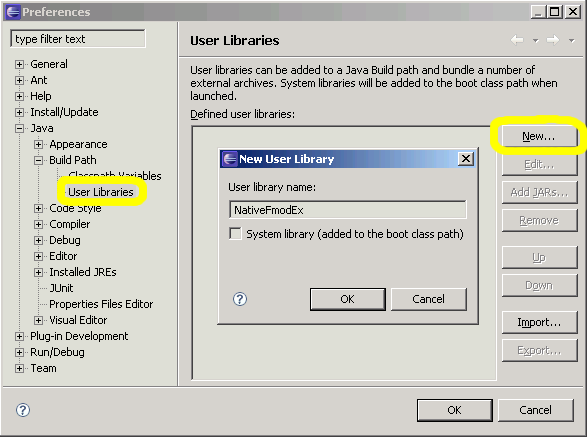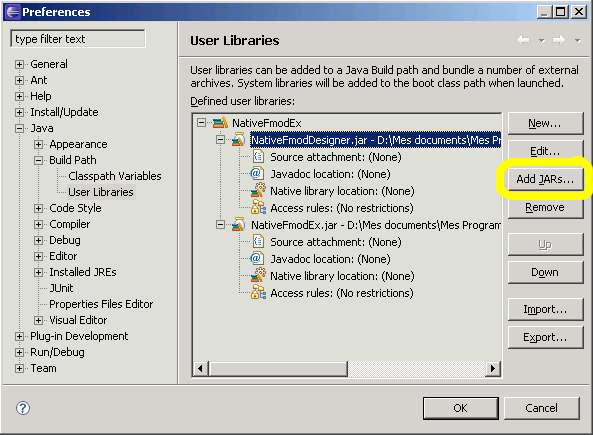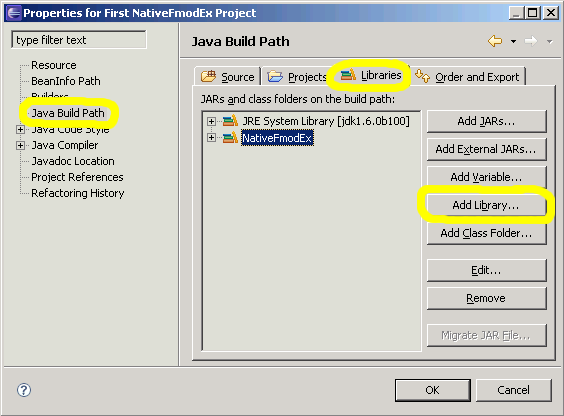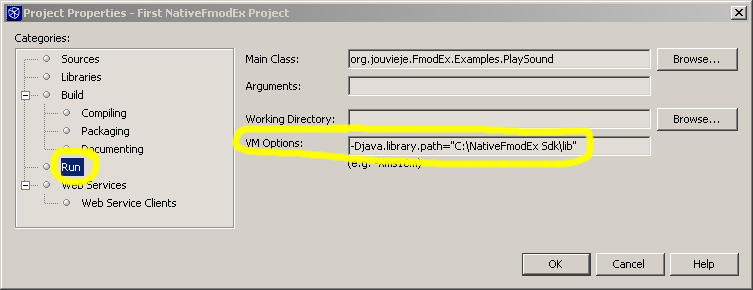![]()
![]()
![]()
This tutorial an introduction to FMOD Ex audio system in Java
using NativeFmodEx, and how to install and use them.
NativeFmodEx now includes an installer, which imports all necessary file from
FMOD Ex installation (FMOD Ex also includes an installer).
This will certainly help you make NativeFmodEx works on your computer.
![]()
'The FMOD Ex sound system is a revolutionary new audio engine for game
developers, multimedia developers, sound designers, musicians and audio engineers, based on the
years of experienced of Firelight Technologies previous product FMOD.'
FMOD Ex
Firelight Technologies
Firelight Technologies also introduce a new tool based on FMOD Ex API : FMOD
Designer.
'FMOD Designer is a tool for creating complex audio events for playback with the FMOD Ex Music
and Sound Effects System. It allows the sound designer to model real-world sounds using layering,
cross-fading, DSP effects and randomized behaviour. It also allows the programmer to dynamically
control these events at runtime in order to realize a rich, interactive soundscape.'
FMOD Designer
Firelight Technologies
Like for FMOD, FMOD Ex API does not have a support for
the java programming language.
Like for NativeFmod project, NativeFmodEx is here to made the bridge between
Java and FMOD (C/C++ library).
I've starten this project at the end of February 2005, when FMOD Ex was in alpha development
stage (4.00.16). Someone ask me if I plan to make
a Java support for FMOD Ex, like for FMOD.
That's when this project was created.
Like NativeFmod,
NativeFmodEx is based on JNI Java Native Interface API. I've completely write NativeFmodEx by my own
(no SWIG). This project benefit of the experience
acquired with NativeFmod.
I've created a cleaner and more professional project (I know this was not the case for
NativeFmod project at start and during lot of versions).
The first public version of NativeFmodEx was available next month of its
creation. The first
stable version was available in August, after 5 months of active development !
Now, NativeFmodEx is updated when major changes/bug fix are performed on FMOD Ex
API.
First download the last NativeFmodEx API and
FMOD Ex API. If it is the first time you use NativeFmodEx, I advice you to download NativeFmodEx Sdk
(Runtime + examples).
Extract NativeFmodEx and install FMOD Ex in any folder you want.
An installer is provided with the Sdk distribution, with many
examples ready-to-run (about 30 examples). Those examples are the example
distributed with FMOD Ex and ported by me to Java.
See the file NATIVEFMODEX_FOLDER/Examples/Examples_Readme.txt for informations on
particular examples. Read this for some help to run examples
externaly to the installer or in your own platform (installer supports only
windows, linux/mac platforms will be added when I will have free time).
Here are the files needed for using NativeFmodEx in your application :
NATIVEFMODEX_FOLDER/lib/NativeFmodEx.jar
NATIVEFMODEX_FOLDER/lib/NativeFmodEx.dll
[Windows only]
NATIVEFMODEX_FOLDER/lib/libNativeFmodEx.so
[Linux only]
NATIVEFMODEX_FOLDER/lib/libNativeFmodEx.jnilib
[Mac only]
FMODEX_FOLDER/api/fmodex.dll
[Windows only]
FMODEX_FOLDER/api/libfmodex.so [Linux
only]
FMODEX_FOLDER/api/libfmodex.jnilib
[Mac only] //jnilib is the universal
library distributed here
without any warranty !
If you also want to use FMOD Designer (org.jouvieje.FmodDesigner), you will need to use those files :
NATIVEFMODEX_FOLDER/lib/NativeFmodDesigner.jar
NATIVEFMODEX_FOLDER/lib/NativeFmodDesigner.dll [Windows
only]
NATIVEFMODEX_FOLDER/lib/libNativeFmodDesigner.so [Linux
only]
NATIVEFMODEX_FOLDER/lib/libNativeFmodDesigner.jnilib [Mac only]
FMODEX_FOLDER/api/fmod_event_net.dll [Windows
only]
FMODEX_FOLDER/api/libfmodevent.so [Linux
only]
FMODEX_FOLDER/api/libfmodevent.jnilib
[Mac only] //jnilib is the universal
library distributed here
without any warranty !
There is two ways for installing NativeFmodEx : in your JDK/JRE or directly with your application.
The advantage of the second way is that we don't need to have access to JDK/JRE (ie don't need administrator rights),
so this will works everywhere (ie every computer and platforms supported).
Note :
libfmodex.jnilib & libfmodevent.jnilib are universal libraries build (by me)
JRE_FOLDER point towards jre folder of JDK (Java Development Kit) or JRE (Java
Runtime Environment).
For example, on Windows platform, it can be :
C:\Java\jdk1.4.2_09\jre\ [JDK]
or :
C:\Java\jdk1.4.2_09\ [JRE]
Copy all jars into the folder :
JRE_FOLDER/lib/ext
Copy the libraries (dll/so/jnilib) for your platform here :
JRE_FOLDER/bin/
[Windows - dll]
JRE_FOLDER/lib/i386/ [Linux
- so]
JRE_FOLDER/***/
[Mac - dylib/jnilib]
Now, you're ready to use FMOD Ex with Java !
You can also install NativeFmodEx outside Java SDK/JRE.
This is usefull if you don't
have access to the JDK/JRE, for deploying your application on another station,
for including NativeFmodEx directly with your application ...
For this put all jars and libraries in a folder (refered by LIB_FOLDER).
At runtime, you will have to indicates where NativeFmodEx is. This can be done using
java.library.path and classpath like this :
|
Linking NativeFmodEx at runtime |
java -Djava.library.path=LIB_FOLDER -classpath
LIB_FOLDER/NativeFmodEx.jar main |
This way is also easier for multi-platform deployment. Simply put all
files mentionned above and NativeFmodEx will choose the right file.
At start,
NativeFmodEx will search the library in java.library.path folder and system
dependant library folder.
If you use a development environment like Eclipse or
NetBeans, NativeFmodEx jars and libraries can be linked directly to your project.
Now, you have install NativeFmodEx and you probably want to use/try it.
To begin we will see how to run examples included in NativeFmodEx SDK. Then, we will
see how to creates project under Eclipse et NetBean IDE.
Examples are written with Java 1.5 (also called Java 5).
Due to they use the new java syntax, you will need Java 1.5 for executing them.
If you have older versions of Java, don't be worry, NativeFmodEx is written and
compatible with Java 1.4.
[Read Linux version]
To run an examples, just double click on one Batch file from SDK
distribution (*.bat). To know what is the java command used to run the example, just open the file with a text
editor.
If the example don't run and you have a similar error (I don't know exactly the error
displayed under an english system) :
|
Java not found |
"java" is not a known command ... |
Read
Installation of Java.
You can also execute them using a DOS terminal ("Invite de commande" in french) with Start/Execute/cmd.exe.
Go to the NativeFmodEx examples folder using the 'cd' commande.
Then execute an example using this script :
|
FMOD Ex example script |
java -Djava.library.path=../lib -classpath NativeFmodEx-Examples.jar;../lib/NativeFmodEx.jar org.jouvieje.FmodEx.Examples.<example_name> |
Replace <example_name> by the name of the examples ie ChannelGroups, Effects, PlaySound,
PlayStream, ...
Here is a capture for PlaySound example :

Run PlaySound
Warning :
Some examples like CDPlayer and NetStream needs extras parameter :
java ... .Examples.CDPlayer f
java ... .Examples.NetStream
http://jerome.jouvie.free.fr/downloads/NativeFmod/jules.mp3
For FMOD Designer examples, use this script :
|
FMOD Designer example script |
java -Djava.library.path=../lib -classpath NativeFmodEx-Examples.jar;../lib/NativeFmodEx.jar;../lib/NativeFmodDesigner.jar org.jouvieje.FmodDesigner.Examples.<example_name> |
![]()
This part is dedicated to the wonderfull Java development
environment :
Eclipse.
Extract the examples and create a new project named "First NativeFmodEx Project"
from the folder :
NATIVEFMODEX_FOLDER/Src/Examples
(Copy the folder Media and SimpleEventMedia
from NATIVEFMODEX_FOLDER/Examples to get the musics needed by the examples. You
should have imported them from
FMOD Ex distribution with Installer.jar )
If you don't have installed NativeFmodEx in JDK/JRE, a lot of errors should be printed
(org.jouvieje.FmodEx.* cannot be resolved ...). But no worry, we will see how to fix
all these errors.
Your workspace should looks like this :

Eclipse workspace (1)
Now, you have to points NativeFmodEx to your project.
There is a cool way for this under Eclipse. Use 'User Library' feature :
Windows->Preferences->Java->Build
Path->User Libraries
Create a new user library named "NativeFmodEx" :

Create NativeFmodEx library
Then, click on "Add JARs" button and select
NativeFmodEx.jar and NativeFmodDesigner.jar from
NATIVEFMODEX_FOLDER/lib/ folder.
You will get this screen :

Add JARs
Note :
Just for informations, *.dll files are libraries for Windows, *.so for Linux and
*.jnilib for Mac. FMOD Designer jar & libraries are only necessary in case of
use of the package org.jouvieje.FmodDesigner.
You DON'T need to include all libraries, just use those needed (ie don't include
FMOD Designer jar/libraries if you don't have any use of them).
You've just linked NativeFmodEx jars, now you have to link libraries.
Double clic on "Native library location: (None)" under the two enties entry and
select the folder (with "External Folder ...") in which there
is NativeFmodEx libraries (NATIVEFMODEX_FOLDER/lib/
folder).

Select libraries location
Optional :
You can attach NativeFmodEx/NativeFmodDesigner sources by selecting
NativeFmodEx-src.jar & NativeFmodEx-src.jar from their respective
folders ie NATIVEFMODEX_FOLDER/src/NativeFmodEx/Java/
& NATIVEFMODEX_FOLDER/src/NativeFmodDesigner/Java/.
Similarly, you can attach NativeFmodEx javadoc by selecting NativeFmodEx javadoc
folder (in NativeFmodEx Javadoc.rar).
Finally, you will have something like this :

User Library settings
Note :
I've included NativeFmodDesigner in NativeFmodEx user library, you can create a
second user library for NativeFmodDesigner.
NativeFmodEx user library is now created. You will see how it is easy to
use it.
Go to Properties of the project. Choose the tab 'Libraries' and
select 'Add Library'.
On 'Add Library' window, select NativeFmodEx user library.

Attach NativeFmodEx user library
Now, all the above errors should disappear (except may be for
Geometry_ and Demo3D example which uses
JOGL-JSR231, look at OpenGl section
for some hints to installing/using JOGL.
The examples requieres Java 1.5 (also known as 5.0) or greater.
Check the JRE selected in
Window/Preferences/Java/Installed JREs is at least Java 1.5 (ie use Java
5) and in
Window/Preferences/Java/Compiler that Compiler compliance level
is a least 5.0.
Remark : NativeFmodEx is written with Java 1.4. Only example needs Java
1.5 or later.
To run an example, such as DspPluginViewer,
right click on it and select Run as -> Java
Application.
Note 1 :
Don't be surprised if a lot of informations are printed in the Eclipse's console. Eclipse
console consider \r as \n. When an information is updated, changes are displayed in a new line
instead of the current one.
Note 2 :
An alternative and NOT-RECOMMENDED way is presented
here.
![]()
I assume that you've already read Eclipse part.
I don't have used NetBeans a lot, but I will show a possible way to use
NativeFmodEx under Eclipse.
This involve :
- Indicating where are NativeFmodEx jars.
- Indicating where are FMOD Ex & NativeFmodEx libraries.
First, create a project in any folder you want (PROJECT_FOLDER) and put all files from :
NATIVEFMODEX_FOLDER/Src/Examples
Also copy Media and SimpleEventMedia folders from :
NATIVEFMODEX_FOLDER/Examples.
Go to project's properties window and select NativeFmodEx jars in
Libraries/Compile/Add JAR/Folder :

Selecting Jars in NetBeans
Select Run tree's item and add java.library.path in VM Options :

Selecting libraries in NetBeans
Finally, run the project !
For more details informations, please refer to Eclise
install process.
![]()
|
![]()
| Last modified on 01/07/2010 | |
| Copyright © 2004-2010 Jérôme JOUVIE - All rights reserved. | http://jerome.jouvie.free.fr/ |